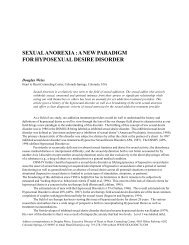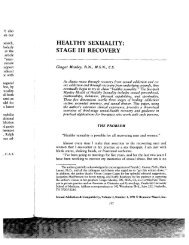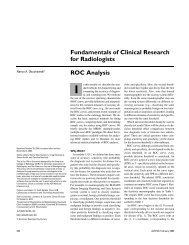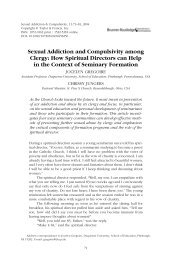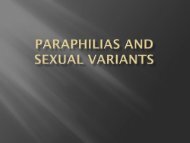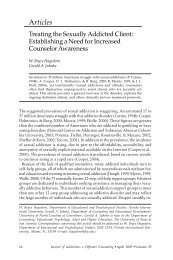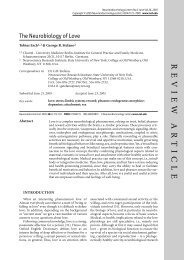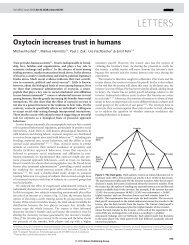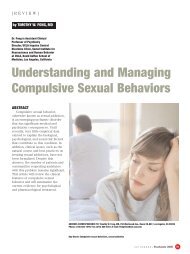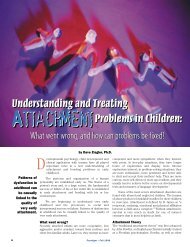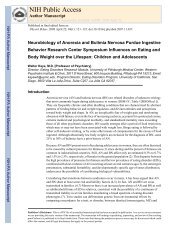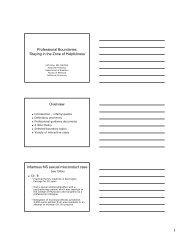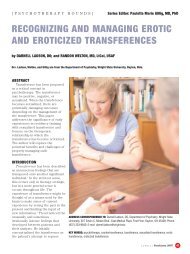An Overview of Psychiatric Ethics
An Overview of Psychiatric Ethics
An Overview of Psychiatric Ethics
Create successful ePaper yourself
Turn your PDF publications into a flip-book with our unique Google optimized e-Paper software.
“normal” member <strong>of</strong> that culture placed in another) would be deemed “mentally ill” in the view <strong>of</strong>cultural relativism. This explains the position that delusions, for example, must be beliefs inconsistentwith the person’s culture. In clinical practice, such a perspective requires that the clinician be aware<strong>of</strong> the need to see the patient’s experience in the context <strong>of</strong> their particular culture. In other words,the question must be “how would a typical member <strong>of</strong> this group view this situation?”54Alienism and Mental HygieneThe term “alienism” refers to the 19th Century view in Western psychiatry that persons sufferingfrom mental illness were thought to be “alienated” from society and themselves. This view derivedpredominantly from the study <strong>of</strong> mentally disordered <strong>of</strong>fenders and the assumed relationshipbetween mental illness and criminality. In forensic settings, psychiatrists were termed “alienists”.Mental hygiene is defined as the process <strong>of</strong> “preserving the mind against all incidents and influencescalculated to deteriorate its qualities, impair its energies, or derange its movements”. 394 The mentalhygiene approach addressed all factors in society which may be injurious to mental health. Themovement gained prominence in post-war Western psychiatry and reached its peak in the work <strong>of</strong>Adolph Meyer in the USA.Colonial and Post-Colonial PsychiatryThe trauma <strong>of</strong> cultural displacement and the legacy <strong>of</strong> colonisation are critical in conceptualisingthe mental health <strong>of</strong> indigenous populations. Under colonial rule, psychiatry was <strong>of</strong>ten co-optedinto the subjugation <strong>of</strong> indigenous populations, such as in French Algeria. Frantz Fanon’s book TheWretched <strong>of</strong> the Earth 395 highlighted how European psychiatry functioned in a colonial setting toalienate the colonized population from their society by forcing a questioning <strong>of</strong> identity through theEuropean psychiatric prism.Fanon, like Che Guevara, was a medical practitioner and revolutionary. In addition to hisrevolutionary politics, Fanon pursued a project <strong>of</strong> reform in the psychiatric pr<strong>of</strong>ession in Algeria,creating a dialectic <strong>of</strong> psychiatrist or street fighter. 396 Indeed, Fanon’s double life as a colonial-erapsychiatrist and as an Algerian Front de Libération Nationale (FLN) activist has invited much criticismin revisionist views <strong>of</strong> his life. His most recent biographer refers to his reputation as a “talentedhater”, 397 and other critics cannot look past his complicity in FLN atrocities, such as bombings andsabotage. 398Fanon identified colonial psychiatry in Algeria as Eurocentric and as exerting a hegemonic culturalinfluence upon the population as a perpetuation <strong>of</strong> the “colonizer-colonized” dynamic. The culturalestrangement and institutionalized racism brought about by Eurocentric psychiatry creates a sense<strong>of</strong> “the Other” in the colonized population, forcing them to constantly question “Who am I?” Whilstmuch <strong>of</strong> the psychiatric material in Fanon’s other works, The Wretched <strong>of</strong> the Earth 395 and BlackSkin, White Mask 399 was co-written and possibly anecdotal, 400 his main contribution to the field <strong>of</strong>psychiatry was the requirement <strong>of</strong> a “common culture” between psychiatrist and patient. 401 Fanonreformulated Lacan’s notion <strong>of</strong> méconnaissance 402 to the alienation <strong>of</strong> the colonized Other fromcultural, social and political elements, through a process <strong>of</strong> internalizing injustice. 403 Fanon rejectedEurocentric psychiatry as it presented a means <strong>of</strong> conforming to the “psychology <strong>of</strong> the colonized”.Madness was therefore sociogenic in Fanon’s view, and so psychiatric treatment, in the tradition <strong>of</strong>Pinel, took place in psychiatric institutions that functioned as institutions <strong>of</strong> social change. Indeed,Fanon has been described as a “social psychiatrist driven by humanism to unmask inhumanity”. 396Even in post-colonial societies, there are remnants <strong>of</strong> alienist themes in psychiatric institutionswhich have evolved largely as recreations <strong>of</strong> those <strong>of</strong> the previous colonizing power. 404 One possibleinstance <strong>of</strong> this are the “Culture Bound Syndromes”, including such diagnoses as “amok” found inthe Malay culture, and “uqamairineq” among the Yupik Eskimos. Culture-bound syndromes are seenas “folk illnesses” in which changes <strong>of</strong> behaviour figure prominently. 405 The phenomenon <strong>of</strong> “amok”,found in Malaysia and Indonesia, involves a person (usually male) exhibiting a deranged state <strong>of</strong>agitation and hostile aggression, <strong>of</strong>ten leading to destruction <strong>of</strong> property. From the perspective <strong>of</strong>the person’s culture, such behaviour is viewed as being within the bounds <strong>of</strong> normal behaviour. Inthe era <strong>of</strong> British colonial rule, and its associated psychiatric institutions, such behaviour representedgrounds for involuntary psychiatric treatment. Thus a Western pathologizing <strong>of</strong> a normal behaviourrepresented an example <strong>of</strong> the use <strong>of</strong> psychiatry as a process <strong>of</strong> exerting social control. The



